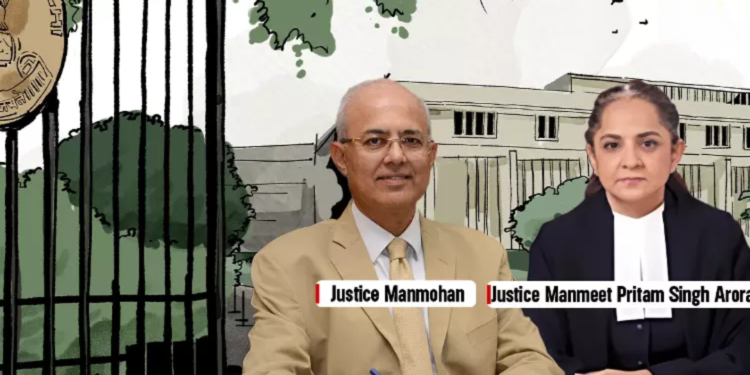The Delhi High Court has recently issued several directives aimed at maintaining hygiene in dairies across the national capital, ensuring proper medical care for cattle housed there, and addressing the use of counterfeit oxytocin.
A division bench comprising Acting Chief Justice Manmohan and Justice Manmeet Ps Arora was not initially convinced by the submission of the Delhi Government’s Chief Secretary, suggesting that cattle in dairies near sanitary landfill sites in Delhi could continue to be exposed to hazardous waste until 2025-26.
The court expressed concern that the respondents appeared to be ignoring the potential severe health risks posed by milk produced in these dairies to the residents of GNCTD (Government of National Capital Territory of Delhi).
The bench directed that existing dairies must comply with four specific licensing or registration requirements: approval under the MCD Act, authorization from the animal husbandry department of GNCTD, a license or No Objection Certificate (NOC) from the Delhi Pollution Control Committee (DPCC) under the Water and Pollution Act, and a license from the food authority.
The court also ordered that Veterinary Hospitals be operational immediately near all designated dairies.
“Biogas plants should be installed near all nine authorized dairies in Delhi to produce dry manure and biogas fuel/Compressed Biogas (CBG) at the earliest, preferably before the onset of the monsoon,” the court stated.
Additionally, the court instructed the Food Safety and Standards Authority of India (FSSAI) or the Delhi Government’s Department of Food Safety to intensify testing and conduct random sample checks of milk for chemical contamination in all nine designated dairies. This testing should also extend to milk products like sweets from areas where milk is supplied, with appropriate legal action to be taken in case of any violations.
Additional directives include:
Determining the total number of allotted plots in a specific colony designated for dairy use, along with the count of cattle housed on these plots. This assessment will also identify plots allocated for dairy purposes but utilized for non-dairy activities such as commercial ventures or residences.
Enumerating the number of dairies managed directly by owners versus those leased out to others, and categorizing the cattle into cows, buffaloes, and calves.
Mandating dairy owners to prominently display ownership details of dairy plots along with the number of cattle housed on-site.
Mapping and identification tasks will be conducted by Para Legal Volunteers of the Delhi State Legal Services Authority (DSLSA).
The land-owning agency (DUSIB) must deploy adequate officials to coordinate and assist in the mapping and identification process, to be completed within six weeks from the date of the order.
Dairy owners are required to tag their cattle using designated tag numbers from the Information Network for Animal Productivity and Health (INAPH) Scheme under the Central Government. Any untagged cattle after six weeks will be seized and sent to designated gaushalas.
Conducting awareness camps within the colony by the Animal Husbandry Department (AHD) assisted by DSLSA, to educate about the prohibition on using oxytocin/hormones and its adverse effects on animals and humans, including infants consuming such milk directly or indirectly.
Ensuring that cattle are kept in suitable conditions, and any disease or injury is promptly reported to the Veterinary Officer of the Government Veterinary Hospital.
Regular inspections by the Delhi Society for Prevention of Cruelty to Animals (Delhi SPCA) to monitor cattle conditions and report any issues to the Veterinary Officer promptly. Delhi SPCA will ensure that cattle are not tied too tightly, restricting their movements.
Dairy owners must install sufficient exhaust fans/ceiling fans for proper ventilation in dairy plots, with compliance verification through regular inspections by the AHD.
The Delhi Police is directed to provide full cooperation to prevent law and order issues. Respondents are required to submit their Action Taken Report within eight weeks from the date of the order.
The bench instructed the Chief Secretary to submit a detailed affidavit by May 24 outlining the future roadmap for the nine dairy colonies.
The next hearing is scheduled for May 27.
Additionally, the court has expressed concern about government authorities’ neglect of dairies near landfills, emphasizing the importance of safeguarding the food cycle and citizens’ health.
The case involves allegations that dairy colonies in Delhi are violating various laws enforceable by government authorities, brought forward by petitioners Sunayana Sibal, Asher Jessudoss, and Akshita Kukreja.
Previously, officials, including the Delhi Government’s Chief Secretary, were tasked with exploring suitable land options for relocating the Ghazipur and Bhalaswa dairies.
In earlier proceedings, the court advocated relocating dairies in the national capital to areas equipped with proper sewage, drainage systems, biogas plants, ample open spaces for cattle movement, and sufficient grazing areas.

















